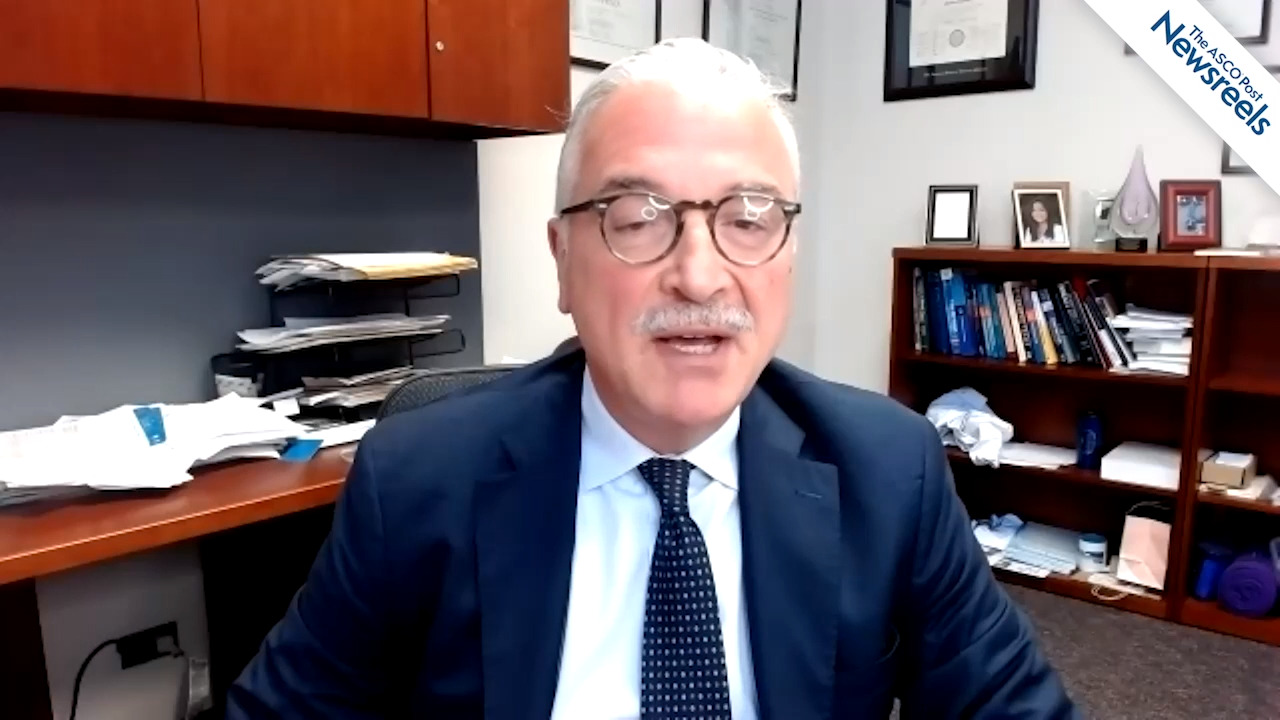2021 ASCO Annual Meeting
Does Vitamin D Supplementation Improve Prognosis for Patients With Breast Cancer?
A research team has found that sufficient vitamin D levels at the time of diagnosis may be associated with improved outcomes among people with breast cancer. These findings were presented by Yao et al...
ADAPT: Survival Outcomes After Neoadjuvant Dual HER2 Therapy for HR-Negative, HER2-Positive Breast Cancer
The first overall survival analysis of the WSG-ADAPT HR-/HER2+ study, which evaluated neoadjuvant therapy in patients with hormone receptor (HR)-negative, HER2-positive breast cancer, showed that trea...
Omid Hamid, MD, Discusses RELATIVITY-047
Omid Hamid, MD, Chief of Translational Research/Immuno-Oncology at The Angeles Clinic & Research Institute, Los Angeles, and Co-Director of the Cutaneous Malignancy Program at Cedars-Sinai Cancer ...
Targeting LAG-3 and PD-1 With Relatlimab and Nivolumab: A New Option Under Study in Advanced Melanoma
Immune checkpoint inhibition has been established as an effective treatment for patients with metastatic melanoma. A novel immunotherapeutic combination—this one targeting the LAG-3 (lymphocyte-activa...
Use of Integrative Medicine by Patients With Breast Cancer
Nearly three-quarters of patients with breast cancer (73%) reported using at least one type of complementary medicine after cancer diagnosis, while surveyed oncologists believed that less than half (4...
Ingrid A. Mayer, MD, on Triple-Negative Breast Cancer: Platinum-Based Chemotherapy vs Capecitabine
Ingrid A. Mayer, MD, of Vanderbilt University Medical Center, discusses phase III results from a trial that showed patients with triple-negative breast cancer who had residual invasive disease after n...
Karim Fizazi, MD, PhD, on Prostate Cancer: Abiraterone Acetate, Prednisone, and Radiotherapy in Metastatic Disease
Karim Fizazi, MD, PhD, of Institut Gustave Roussy, discusses first results from the phase III PEACE1 trial, which showed that abiraterone plus androgen-deprivation therapy and docetaxel improves radio...
Robert J. Motzer, MD, on RCC: Quality of Life for Patients Treated With Lenvatinib-Based Therapy vs Sunitinib
Robert J. Motzer, MD, of Memorial Sloan Kettering Cancer Center, discusses health-related quality-of-life data from the phase III CLEAR trial, which compared lenvatinib plus pembrolizumab or everolimu...
Massimo Cristofanilli, MD, on Breast Cancer: Updated Analysis on Palbociclib Plus Fulvestrant
Massimo Cristofanilli, MD, of the Feinberg School of Medicine at Northwestern University, discusses updated overall survival data from the phase III PALOMA-3 trial of palbociclib plus fulvestrant in w...
Brian I. Rini, MD, on RCC: Pembrolizumab Plus Axitinib vs Sunitinib as First-Line Therapy
Brian I. Rini, MD, of Vanderbilt University, discusses findings from KEYNOTE-426, the longest follow-up of a checkpoint inhibitor (pembrolizumab) combined with a VEGF/VEGFR inhibitor (axitinib) for fi...
Vamsidhar Velcheti, MD, on NSCLC: Sotorasib in KRAS-Mutated Disease
Vamsidhar Velcheti, MD, of New York University, discusses overall survival and exploratory subgroup analyses from the phase II CodeBreaK 100 trial, which evaluated the use of sotorasib in pretreated K...
No Survival Difference for Front-Line Combination Regimens in Intermediate- and Poor-Risk Clear Cell RCC: Real-World Outcomes
A large retrospective study of real-world patients with renal cell carcinoma (RCC) showed similar survival outcomes for patients with intermediate- or poor-risk disease regardless of whether they were...
Results of a Restrictive Opioid Prescription Protocol for Patients With Cancer Undergoing Surgery
Seeing an opportunity to safely reduce the number of opioid doses prescribed to patients with cancer, researchers proposed a new pain management guideline for all patients undergoing surgery at Roswel...
High-Dose Interferon or Ipilimumab vs Pembrolizumab for High-Risk Resected Melanoma
Patients with high-risk melanoma who had a course of pembrolizumab had longer recurrence-free survival than patients who received either ipilimumab or high-dose interferon after surgery. These finding...
Adjuvant Pembrolizumab Extends Disease-Free Survival in High-Risk Renal Cell Carcinoma
Immunotherapy following surgery significantly improved disease-free survival compared to placebo among patients with high-risk clear cell renal cell carcinoma (RCC), according to results from the inte...
Nivolumab Plus Chemotherapy and Nivolumab Plus Ipilimumab as First-Line Treatment for Patients With Advanced Esophageal Cancer
The first results from the phase III CheckMate 648 study represent significant progress in the treatment of patients with advanced esophageal squamous cell carcinoma. The trial evaluated first-line tr...
Efficacy of Platinum Chemotherapy vs Capecitabine for Basal-Like Triple-Negative Breast Cancer
About 80% of triple-negative breast cancers are classified as the subtype basal-like. Typically, patients with triple-negative breast cancer receive chemotherapy before surgery. The presence of residu...
Remote Monitoring Program Reduced Hospitalization Among Patients With Cancer Infected With COVID-19
A study by researchers at Mayo Clinic Cancer Center found that patients with cancer diagnosed with COVID-19 who received care at home via remote patient monitoring were significantly less likely to re...
Extended Follow-up of Nivolumab/Ipilimumab for Metastatic Melanoma
In the longest follow-up results from a clinical trial of combination immunotherapy for metastatic melanoma, investigators report that nearly half the patients who received the drugs nivolumab and ipi...
Novel PSMA-Targeted Radiotherapy Improves Radiographic Progression-Free and Overall Survival in Metastatic Prostate Cancer
Lutetium-177–PSMA-617 (Lu-177–PSMA-617)—an investigational radioligand therapy—significantly improved radiographic progression-free survival and overall survival when added to standard of care compare...
OUTBACK Trial: No Survival Benefit With Adjuvant Chemotherapy After Standard Chemoradiation for Locally Advanced Cervical Cancer
Cervical cancer is the fourth most common cancer in women worldwide, and the leading cause of cancer-related death among women in Eastern, Western, Middle, and Southern Africa. Globally, in 2018, appr...
Electronic Olfaction System Under Study as Screening Tool for Pancreatic and Ovarian Cancers
An odor-based test that detects vapors emanating from blood samples was able to distinguish between benign and pancreatic and ovarian cancer cells with up to 95% accuracy, according to a new study pre...
Sotorasib for KRAS G12C–Mutated NSCLC: Overall Survival and Exploratory Subgroup Analyses
Results from the phase II cohort of the CodeBreaK 100 study showed that treatment with the KRAS G12C inhibitor sotorasib achieved a 37.1% objective response rate and a median overall survival of 12.5 ...
Study Examines Relationship Between Risk of COVID-19 Infection and Breast Cancer Treatment
In a study led by researchers at NYU Langone Health and its Perlmutter Cancer Center involving more than 3,000 women treated for breast cancer at the height of the COVID-19 pandemic in New York City, ...
Transoral Surgery Followed by Lower-Dose Radiation in Patients With HPV-Associated Oropharyngeal Cancer at Intermediate Risk of Recurrence
The phase II E3311 trial offers new information about using reduced-intensity treatment in patients with human papillomavirus (HPV)-associated oropharyngeal cancer who are at intermediate risk of recu...
Byoung Chul Cho, MD, PhD, on NSCLC: Amivantamab Plus Lazertinib for Treatment of Relapsed Disease
Byoung Chul Cho, MD, PhD, of the Yonsei Cancer Center, discusses study results that showed treatment with the EGFR-MET bispecific antibody amivantamab plus the EGFR inhibitor lazertinib yielded respon...
Pasi A. Janne, MD, PhD, on NSCLC: Patritumab Deruxtecan to Target HER3
Pasi A. Janne, MD, PhD, of Dana-Farber Cancer Institute, discusses study findings that show patritumab deruxtecan is effective in patients with EGFR-mutated and inhibitor-resistant non–small cell lung...
Taiga Nishihori, MD, on Multiple Myeloma: Maintenance Ixazomib After Transplant
Taiga Nishihori, MD, of the H. Lee Moffitt Cancer Center and Research Institute, discusses the outcome of a trial that explored maintenance therapy with ixazomib after allogeneic hematopoietic cell tr...
Debora S. Bruno, MD, on NSCLC: Racial Disparities in Biomarker Testing and Clinical Trial Enrollment
Debora S. Bruno, MD, of Seidman Cancer Center at Cleveland Medical Center, discusses study findings that show Black patients with advanced or metastatic non–small cell lung cancer tend to be less like...
Linda R. Mileshkin, MBBS, MD, on Cervical Cancer: Adjuvant Chemotherapy After Chemoradiation
Linda R. Mileshkin, MBBS, MD, of the Peter MacCallum Cancer Centre, discusses phase III findings from the OUTBACK trial, which showed that adjuvant chemotherapy given after standard cisplatin-based ch...
Michael J. Morris, MD, on Prostate Cancer: LuPSMA in the Metastatic Setting
Michael J. Morris, MD, of Memorial Sloan Kettering Cancer Center, discusses phase III results of the VISION study, which showed that lutetium-177–PSMA-617 (LuPSMA), a targeted radioligand therapy, plu...
Ian Chau, MD, on Esophageal Squamous Cell Carcinoma: Nivolumab, Ipilimumab, and Chemotherapy for Advanced Disease
Ian Chau, MD, of Royal Marsden NHS Foundation Trust, discusses first results of the CheckMate 648 study, which showed that nivolumab plus chemotherapy and nivolumab plus ipilimumab both demonstrated s...
Toni K. Choueiri, MD, on Renal Cell Carcinoma: Pembrolizumab vs Placebo in Adjuvant Treatment
Toni K. Choueiri, MD, of Dana-Farber Cancer Institute, discusses phase III results from KEYNOTE-564, which evaluated the safety and efficacy of pembrolizumab in the adjuvant treatment of patients with...
Andrew Tutt, PhD, MBChB, on Breast Cancer: Olaparib After Chemotherapy in Germline BRCA1/2–Mutated Tumors
Andrew Tutt, PhD, MBChB, of the Institute of Cancer Research, London, discusses findings from the phase III OlympiA trial, which showed that adjuvant olaparib, a PARP inhibitor, following adjuvant or ...
OlympiA: Adjuvant Olaparib Extends Disease-Free Survival in BRCA-Mutated Early-Stage HER2-Negative Breast Cancer
One year of adjuvant therapy with the PARP inhibitor olaparib extended disease-free survival in patients with high-risk, early-stage, HER2-negative breast cancer with BRCA1/2 germline mutations, accor...
Toripalimab Plus Gemcitabine/Cisplatin Extends Progression-Free Survival in Recurrent or Metastatic Nasopharyngeal Carcinoma: JUPITER-02
According to the results from the phase III JUPITER-02 study, the addition of toripalimab, a humanized IgG4K anti–PD-1 monoclonal antibody, to standard gemcitabine/cisplatin chemotherapy as first-line...
Ponatinib/Blinatumomab Demonstrates High Rates of Complete Molecular Response in Philadelphia Chromosome–Positive ALL
The combination of ponatinib and blinatumomab was found to be safe and highly effective in patients with newly diagnosed or relapsed/refractory Philadelphia chromosome–positive acute lymphoblastic leu...
Study Examines Aromatase Inhibitor–Associated Musculoskeletal Symptoms in a Diverse Population With Early Breast Cancer
A clinical trial in a racially diverse group of postmenopausal women with early breast cancer to study severe pain in the bones, muscles, ligaments, tendons, and nerves caused by aromatase inhibitor t...
Pertuzumab/Trastuzumab Demonstrates Activity in Tissue-Agnostic Trial for Patients With HER2-Positive Tumors
Results from the phase II MyPathway basket trial found that the HER2-targeted therapies pertuzumab and trastuzumab demonstrated durable activity in patients with a wide variety of tumors marked by HER...
Evan J. Lipson, MD, on Melanoma: Relatlimab and Nivolumab in First-Line Treatment of Advanced Disease
Evan J. Lipson, MD, of Johns Hopkins University, discusses primary phase III results from the RELATIVITY-047 study, which showed that relatlimab plus nivolumab as a fixed-dose combination may improve ...
Narjust Duma, MD, and Gladys I. Rodriguez, MD, on A First for Hispanic Women: Formation of a YIA for Latinas
Narjust Duma, MD, of the Carbone Cancer Center at the University of Wisconsin, Madison, and Gladys I. Rodriguez, MD, of South Texas Oncology and Hematology, talk about the underrepresentation of Hispa...
Heather A. Wakelee, MD, on NSCLC: Atezolizumab vs Best Supportive Care After Chemotherapy
Heather A. Wakelee, MD, of Stanford University Medical Center, discusses the primary disease-free survival results of IMpower010, a phase III study that compared adjuvant atezolizumab vs best supporti...
Jingxuan Zhao, MPH, on How Medicaid Expansion Affects Long-Term Cancer Survival
Jingxuan Zhao, MPH, of the American Cancer Society, discusses study findings that showed worse long-term survival among low-income patients with cancer who live in states that have not expanded Medica...
First-Line Nivolumab/Relatlimab vs Nivolumab Alone for Advanced Melanoma
Treatment with the anti–PD-1 therapy nivolumab plus the LAG-3–blocking antibody relatlimab extended time to disease progression for patients with previously untreated, unresectable, or metastatic mela...
Increased PSA Screening Linked to Lower Risk of Advanced Prostate Cancer at Diagnosis and Death From the Disease in Younger Black Patients
Younger Black men undergoing frequent prostate-specific antigen (PSA) screening appear to have both a lower risk of metastasis at the time of prostate cancer diagnosis and of fatal disease, according ...
Does Adjuvant Atezolizumab Extend Disease-Free Survival in Patients With Resected Early-Stage NSCLC?
Patients with resected early-stage non–small cell lung cancer (NSCLC) who received the PD-L1 inhibitor atezolizumab following cisplatin-based chemotherapy had a 34% reduction in the risk of disease re...
Study Finds Income Eligibility Limits for Medicaid May Be Associated With Worse Long-Term Survival Among Newly Diagnosed Patients With Cancer
A study investigating the association between state Medicaid income eligibility limits and long-term survival among newly diagnosed patients with cancer has found that patients living in states with l...
With the Exception of Cervical Cancer, HPV-Related Cancers Are on the Rise, Especially in Older Adults
Although the incidence of cervical cancer has decreased by 1.03% a year over the last 16 years—likely due to screening or human papillomavirus (HPV) vaccination—other HPV-related cancers are increasin...



















